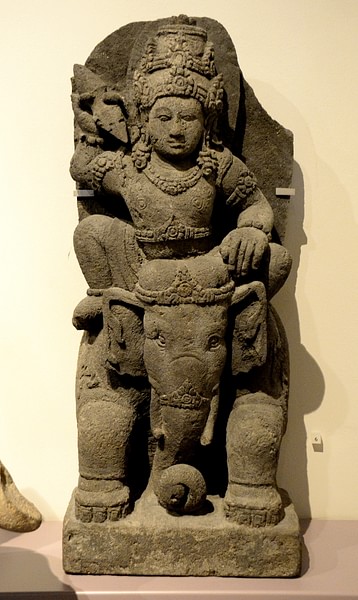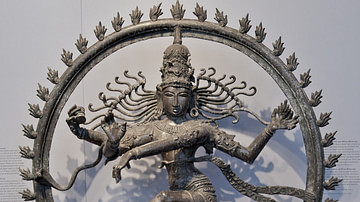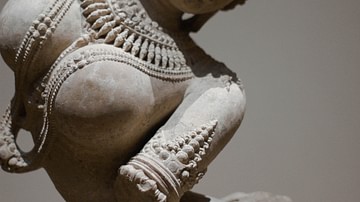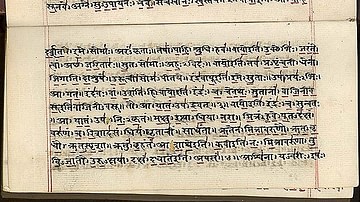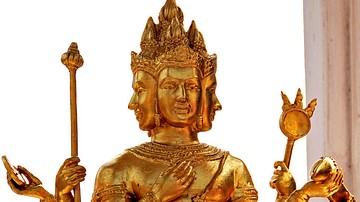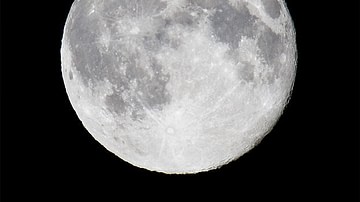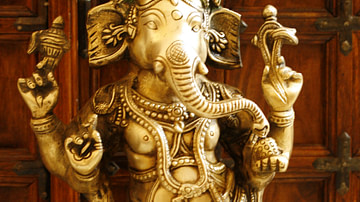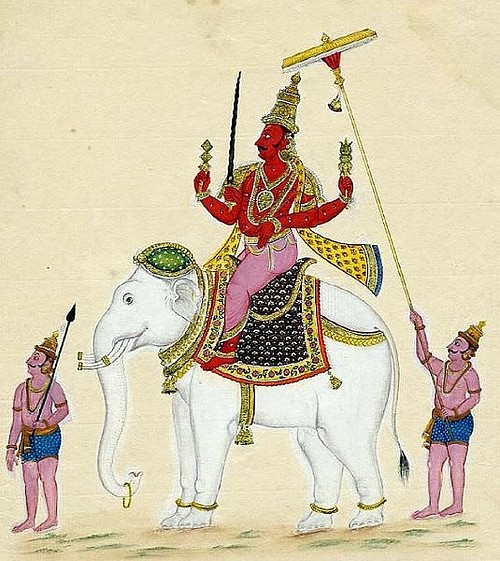
The anthropomorphic god Indra was the most important god in the Vedic religion and he later became a major figure in Hinduism and an important deity in Buddhism, Cham and Chinese tradition. For the Aryas he was their national god and he was regarded as the protector of the military aristocracy and the Kshatriyas warriors. The formidable thunderbolt-wielding Indra strikes an imposing figure but as king of the gods he is generally benevolent, being generous to his worshippers, guaranteeing peace and prosperity and delivering beneficial rainstorms to end droughts. He can also be called upon in times of war to give support with his divine weapons and favourable intervention. In later tradition Indra is transformed from a worshipped god into a mythological figure involved in various, sometimes unflattering, adventures whilst gods such as Vishnu and Shiva replace him at the head of the Hindu pantheon. Nevertheless, Indra continued to be associated with storms, rain and the cardinal point East.
God of Thunder & Storms
In the Hindu creation myth Indra was born (along with his brother Agni) from the mouth of the primordial god or giant Purusha whose various other body parts gave birth to the other members of the Hindu pantheon. These new gods then brought order to the cosmos and Indra, seated on his throne within the storm clouds of the svarga or third heaven is ruler of the clouds and skies alongside his wife Indrāni. In Indian mythology the clouds are equated with divine cattle and the sound of thunder during storms is Indra fighting with the demons who are forever trying to steal these celestial cows. In addition, the rain is equated with Indra milking his divine herd and the god is seen as a protector of earthly cattle belonging to his worshippers. Indra encompasses and controls the universe, balancing the earth in the palm of his hand and manipulating it according to his whim. He also created the rivers and streams by shaping the mountains and valleys with his sacred axe.
Indra has a favourite companion, his pet ape Vrishakapi, but his fondness for the creature did once incur the jealous wrath of Indrāni who then displayed amorous intentions towards Vrishakapi which were reciprocated and when the couple were discovered by Indra, the angry god drove the animal away. However, the tables were turned when, later, Indra himself was discovered in the arms of Vrishakapi's wife by his once faithful pet. Thus being equal in their unfaithfulness the pair's great friendship was restored.
Indra, noted for his virility, was unfaithful to his wife on several other occasions when the god often disguised himself in order to better seduce his victims. One famous object of the god's seemingly insatiable desire was the wife of the sage Gautama. Sometimes Indra did though pay a heavy price for his amorous adventures, for example, he was once so brutally cut to pieces by an outraged husband that the gods struggled to put him back together again. When they did finally manage it they found a rather important piece of him missing and so were forced to complete the god using the member of a ram.
The Adventures of Indra
Indra appears many times in the Vedic scripts, especially the Rig Veda where he has all sorts of weird and wonderful adventures. In the Sanskrit epic Mahabharata, Indra is the father of the hero Arjuna and he manages to win the magic armour that would make his son invincible. Indra was involved in a famous fight against the Dāsas (or Dasyus) and in another famous adventure he swiftly dealt with Vala who one day was bold enough to steal the god's herd of sacred cattle. Vala cleverly hid his prize in the depths of a mountain but was tracked down by Indra's servants the Maruts or Rudras (storm gods), then, one thunderbolt from Indra was enough to split the mountain in two and release the herd who were safely escorted back to the heavens.
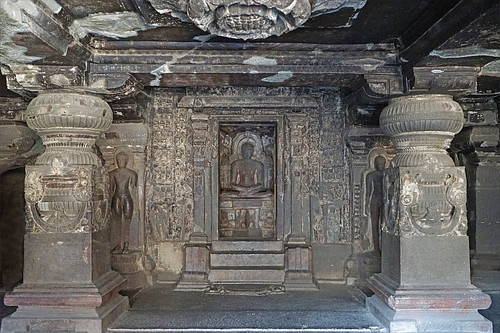
Indra's great friend and protégé Kutsa fought with Sushna ('the Witherer') and at the end of the day when the two were still in combat and darkness seemed about to halt the proceedings Indra delayed the sunset by yanking off a wheel of the sun's chariot. Indra then gave the wheel to Kutsa who used it as a devastating weapon to win the fight.
Indra is, on occasion, portrayed in a less than favourable light in his adventures, for example, he is known for his fondness of the alcoholic elixir drink soma which he does not always take in moderation and so he sometimes suffers from its after-effects. However, the helpful Ashvins gods and the goddess Sarasvati are always on hand to administer an antidote taken from the body of a demon and restore the god to his senses.
Perhaps the most celebrated exploit involving the god is his battle with the demon Vritra. This demon, also known as the Enemy, had transformed himself into a fearsome snake with no less than 99 coils. Unfortunately for local farmers these tremendous coils were blocking up the rivers and streams and causing a great drought. So horrifying was Vritra that none of the gods dared intervene and it was only Indra who found the courage, fortified with soma, to slay the beast with one of his thunderbolts. As a result of this episode he won great favour among the other great gods and one of Indra's surnames became Vritrahan, meaning the 'slayer of Vritra'.
In Other Religions
Indra is known as Sakra in Buddhism and he rules the 33 gods. In Cambodian tradition he is known as Pah En the god of the sky and he is the most popular of the gods. He is considered to live atop Mt. Meru or Prah Sumer along with his servants the Yeaks (Yashas), fearsome ogres with fangs and red eyes who can transform themselves at will into any shape they please. In the Cham religion of Vietnam he is also the god of thunder and rides a white elephant. In Chinese tradition he is identified with the god Ti-shi. Finally, the god is still worshipped today in the Rajasthan region of India in the festival of Inder Puja which calls for rains to prevent the frequent droughts prevalent in this desert state.
Representations in Art
Indra is frequently portrayed wielding a thunderbolt (vajra) but he may also carry the chakra discus, an ankusa or elephant goad and an axe, the tanka. He is often shown riding his white elephant Airāvata who was born from the churning of the seas when the world was created. In later Buddhism the god's thunderbolt becomes a diamond sceptre, the Vajrayana.
